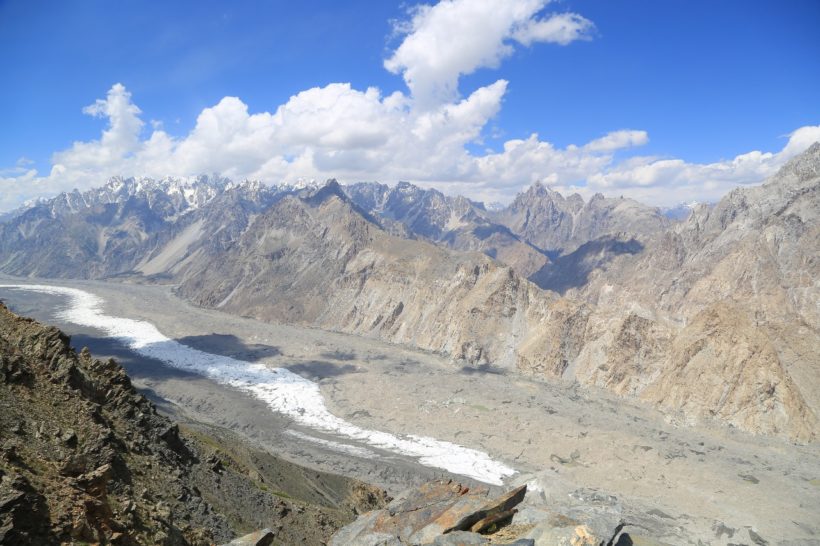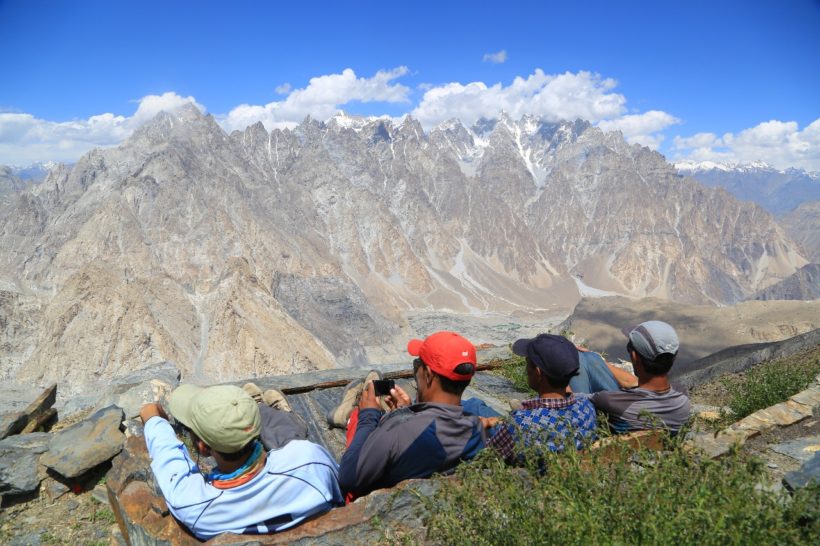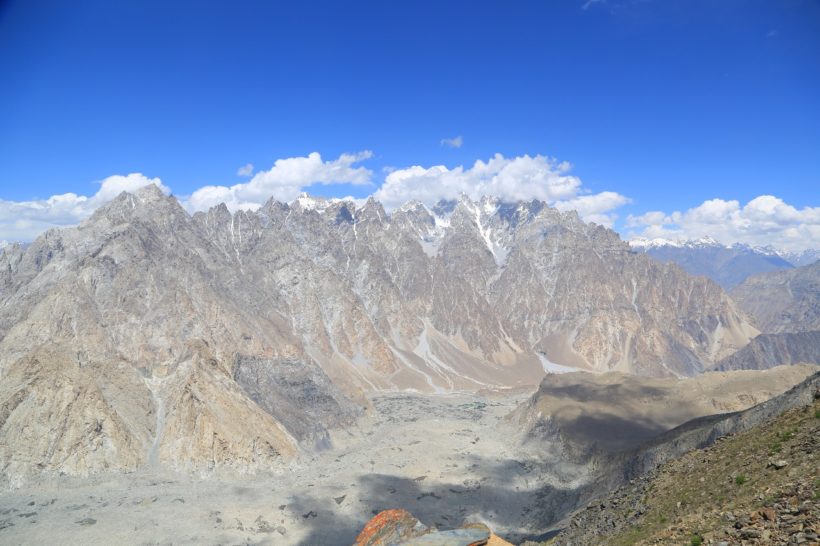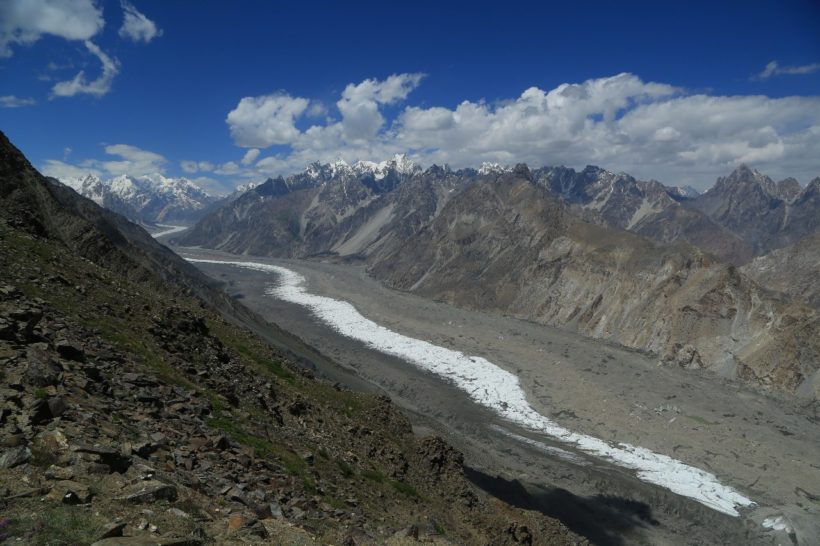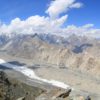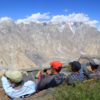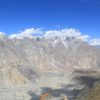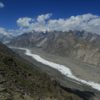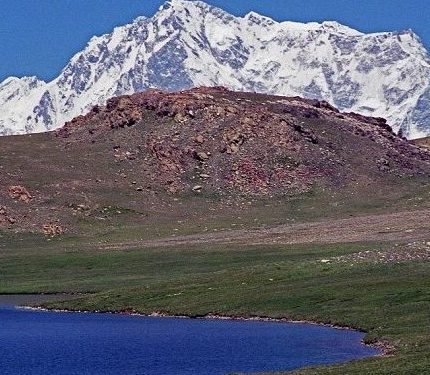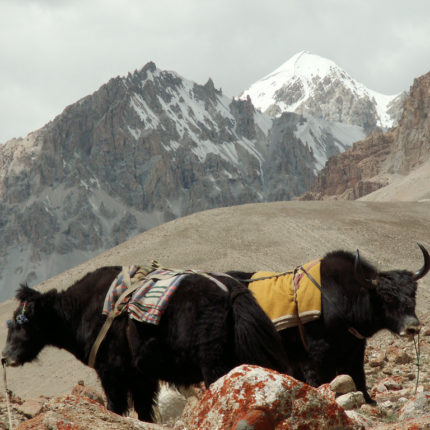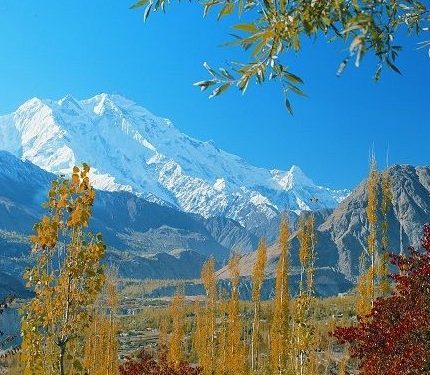Fly Home.
What does Package include?► Government licensed professional guide/leader (pre-requisite for Trek)
► Airport transfers on first and last day from/to Benazir International Airport, Islamabad
► All domestic flights and transfers (according to itinerary)
► All road transport in Pakistan (according to itinerary above)
► All accommodation in Pakistan (hotels and camps) according to itinerary
► All meals in Pakistan (breakfast, lunch and dinner) at hotels and camps
► All trekking requirements on ground (including cook, support staff, porters, gears (excluding personal) etc
► Government trekking permit fees/paperwork for Trek
What does Packages not Include?► Travel insurance
► Visa to Pakistan (Letter of Invitation and other supporting documents will be offered by us for visa application)
► International flights (return tickets)
► Tips for guides, porters, staff etc
► Miscellaneous (drinks, telephone calls, laundry etc at hotels)
► Souvenirs
Food and Meal Plan During the Trek, participants will be served all three meals (breakfast, lunch and dinner). The food will include combination of Pakistani and foreign meals made of ingredients bought in Pakistan. Breakfasts will include coffee, tea, cereals, eggs, porridge/muesli, chappatti/bread. During trekking, lunches will be eaten during lunch breaks with options from tinned/canned meals (fish, meat), crackers, pickles, cheese, chapatti, pate etc. Depending on the weather, the lunches start with or sometimes end with soup, coffee or tea, juices etc. Dinner is always eaten in mess tent which is freshly prepared by our cooks travelling with us. During the initial days of trekking, fresh vegetables are also cooked until they remain fresh. Vegetarians must inform our office in advance if they want their entire meals to be vegetarian.Iodine treated drinking water will be made available in the mornings, during breaks and while camping. Everyone will be drinking spring water when available but at other times, we do not have options other than consuming glacial melt water that might consist of silt. Our kitchen uses a large container for water supply that helps in settling down the silt at the bottom. If you do not like the odor of iodine, you might want to bring your own supply of bi-carbonate of soda. Conventional methods work well for everyone but we keep on experimenting new methods.
Arrival in Islamabad Pakistan and Airport TransferAll our guests must arrive on day 1 at Benazir International Airport, Islamabad (Pakistan’s capital). Our guide/staff will be waiting for you outside the international arrivals gate in the airport premises who will take you to the hotel. All guests must notify us if they do not need transfers from airport. Guests must also submit their inbound and outbound flight details to our office two days before their arrival in Pakistan. Once you confirm your registration and make payment, more details including names and contacts numbers will be sent to you. Airport transfers will also be provided on the last day.
Accommodation
We arrange stays at standard hotels in Islamabad and our hotel picks in Hunza/Skardu are always one of the best in town. Rooms at our selected hotels will be provided on twin-sharing basis and will have en-suite amenities. During camping days, you will also be sharing a two-person tent. If you are traveling alone, you will be teamed with one of the other participants (of the same sex) for room and tent sharing. However you can get separate hotel rooms and separate tents for additional cost but both require booking in advance. Extended hotel reservations in Islamabad are possible.
A typical Day
On all trekking days, your guide will wake you up for warm tea or coffee followed by a good breakfast inside the mess tent(s). You will have time before breakfast to pack your bags again. Camp will be closed after breakfast and porters will get to work carrying supplies and luggage ahead of guests to arrive at the lunch site and prepare meals. Porters will repeat the same “trek-earlier” approach for dinner preparations. We will generally hike for 3-4 hours before lunch. Lunch normally takes at least one hour so it is a good time to gain your strength back, read, write etc.
Trekking after lunch break in the afternoon will generally be shorter than first half of the day. Once you reach the next camp, camps will either be setup or in the process and kitchen crew would serve a hot beverage first and dinner will be served when its ready. One can rest, socialize, read, write, and photograph etc upon reaching a camp. Temperature normally decreases at night and participants can get cozy in their personal sleeping bags before getting enough sleep for the next day.
Domestic Flights
In order to reach your destination (northern areas), we will be taking a flight which is subject to weather as the valley is surround by mountains and requires high visibility for any flight to operate. Due to the weather factor, no flights are guaranteed to operate. Flights to your destination do operate often but there are always chances for cancellations and in that case we keep road transport as backup and on standby. We cannot take the risk of waiting for another day in Islamabad for another flight for good reasons including complex airline booking system, tourist traffic flow in flights etc. Please beware of other trekking companies offering Trek that might keep you waiting in Islamabad in hopes of flights and end up not completing your long-awaited trek on time.
Karakorum Highway (In case of Flight Cancellation)
We advise all our guests to read foreign travel advices on their respective country’s foreign office websites. Travel advice for EU residents from their home country to your destination country (Pakistan) can be found on the European Commission website. Participants from other countries can look up on relevant websites or search “foreign office travel advice”. Most websites advice against travelling by road in Pakistan and some websites don’t seem updated. Please take note that incase one or both internal flights cancel, we will drive on Karakoram Highway and then via Gilgit-Skardu road to Skardu. This route is available on Google maps
Journey on Karakoram Highway is one of the best experiences in Pakistan for any foreign or domestic tourist, providing views of amazing natural environment and indigenous people throughout the road trip and never has any of our guest openly regretted traveling by KKH. We strongly advise that you contact and gain more information from your travel insurance company regarding road traveling coverage. If your company does not offer full coverage for your trekking holiday, you might look for other companies. For example in UK, British Mountaineering Council offers good solutions.
Guide (Leader) and Group Assistance Staff
All participants will be managed by our professional guide for the whole trekking holiday. They will be licensed and recognized from Pakistan’s Ministry of Tourism. Our guide will be the focal person for communication, assistance, help and complaints during the Trek. Our guides have vast experience with foreign clients and can communicate in English. They have been trained to interact with participants in a professional manner and we will appreciate if you keep the relationship friendly and yet professional. If you are a big private group from one country speaking a different language (for example Spanish), we can try rescheduling our guides speaking your language (if available). You will also be accompanied by kitchen crew, assistant(s) depending on the group size and last but not the least, porters.
These tough local porters belong to different villages of the surrounding areas and are mostly small subsistence farmers. They wait for foreign tourists to arrive so that they can earn and compliment to their existing income while their kids look after their small farms. Naturally they are tourist-friendly people who also have fun during trekking by having laughs and dancing to local songs when they get a chance. These porters and their elders have been doing it for decades and watching the porters at work with such energy is another vital offering of this holiday.
Miscellaneous Expenses and Budgeting
For expenses other than your holiday cost, you can carry approximately 240 EUR/250 USD/200 GBP/1700 CNY (or equivalent in your own currency). This can be used for other expenses including tips for porters and supporting staff. You can purchase Pakistani Rupees (PKR) upon arrival at the airport at good rates. US Dollars, Euros and Pound Sterling can quickly be converted into the local currency at the airport.
The porters are paid in Pakistani Rupees, not to mention everything else you may want to purchase in Pakistan. US Dollars will have an advantage of being easily exchanged at even smaller towns but we recommend one-time exchange. Credit cards can come handy for shopping in Islamabad for souvenirs/gift items including rugs. Automated Teller Machines (ATMs) will be available in Islamabad and Skardu but using your debit/credit cards, you will only be able to withdraw Pakistani Rupees from ATMs.
Managing Tips
It is common that our participants at least tip the porters for their hard work carrying participant luggage and supplies. If you feel satisfied with the services of the guide, assistant(s), kitchen crew, you can contribute to the total tip. 95-120 Euros (or equivalent in your currency) would cover this element of the total expenses. The tour leader/guide helps all participants in deciding a tip for all crew members of the Trek. These tips are then handed over as a group in a “thank you” ceremony organized at the conclusion of the trek.
Baggage Allowance
Porters discussed above will be carrying your baggage/luggage apart from supplies, equipments etc. The maximum weight limit for your packed trekking bag is 12.5 kilograms (20 pounds). The load of your sleeping mattress and sleeping bag is included in the maximum limit. Please only bring required items on the trek. It will be possible for you to leave parts of your luggage at the hotel at your particular destination you chose. The maximum limit (12.5 kgs) strictly followed is assigned by the local porters organization. Your baggage allowance will not include equipments for mountaineering that you will bring along for the Trek. We will collect from you the mountaineering equipments at your destination that shall be carried separately by our porters.
Altitude
All our potential guests are advised to read carefully and know the different elevations mentioned above for each trekking day. This is a strenuous trek at very high altitudes. Although this should not worry you as humans are reasonably gifted to become accustomed to high elevations, we must acclimatize according to our well-planned itinerary.
Equipment List
We are providing you with three lists for the Trek. List 1 and 2 contain items and equipments that you must bring. The third list contains optional items you might need on your trekking holiday. Based on your own judgment you can select things that you might need from the third list.
List 1 – Must Bring Items:
► First Aid Pack (Diamox (Altitude), Dioralite (re-hydration salts), antiseptic cream, blister treatment, throat lozenges, plasters, Imodium (diarrhea treatment), painkillers)
► Hiking Backpack (Day Pack) 32-42 Litres
► Fleece jacket with hood or a warm jumper
► Mittens or gloves
► Gloves (Thermal)
► Headtorch with spare batteries
► Hiking boots
► Sleeping bag (-16°C comfort rated)
► Sandals (sports) or old shoes (to cross rivers)
► Sun protection cream (including total block for nose, lips etc.)
► Sunglasses
► Sunhat
► Thermarest or any similar mat/pad for sleeping
► Warm hat
► Warm jacket (down)
► Water bottles 1litre (x2)
► Waterproof jacket
► Waterproof over-trousers
► Antibacterial hand wash
► Shirts/T-shirts
► Small towel
► Socks
► Spare laces
► Underwear (normal and thermal)
► Trekking poles (highly recommended)
► Wash-bag and toiletries
► Walking socks (2/3 pairs)
► Baselayer – leggings (Thermal)
► Trekking Trousers
► Baselayer thermal shirts (2 long sleeves, 2 short sleeves)
► Mountaineering equipments (See “List 2” below)
List 2 – Mountaineering Equipments:
► Crampons
► Mountaineering boots that must be compatible with your crampons. Minimum Grade B2.
► Ice axe
► Climbing harness
► Karabiner/Carabiner (screwgate type x 2)
► Climbing helmet
► Prusik loops X two (2) – (4 meters of 6 mm cord makes up 2)
► Sling (120 cm)
List 3 – Optional:
► Buff or scarf
► Small padlock (for locking your bag)
► Camera
► Insect repellant
► Pen-knife (important: pack sharp tools in hold luggage)
► Repair kit (e.g. thread, needle, duct tape)
► Liner (for sleeping bag)
► Travel clothes
► Bottle for Pee
Minimum Group Participants and holiday Status
The required number of participant bookings i.e. six (6) registrations are required to conduct the “Fixed departures”. Although we receive several guests for each fixed departure, we feel that it is important to mention it. You can make sure of the trip status on this page. Status “available” means we are registering guests and “guaranteed” means we have crossed the required number of participants and the trip will commence on the given dates. We will constantly be in touch with all our guests who register. We will timely guide you step by step regarding visa applications and flight reservations to Pakistan etc.
Travel Documents & Visa
In order to apply for visas to Pakistan, you generally need a passport expiring later than (6) months. For more reliable and updated information, we suggest you to contact the nearest Pakistani consulate or embassy in your country. We expect that you will take full responsibility for ensuring you have the right travel documents. Normally if you are visiting non-EU countries, you must check for 2 vacant pages in your travel document (passport) for every country you plan to travel.
A tourist visa (visit visa) is required to come to Pakistan for trekking. People on work visas (already in Pakistan/abroad) require a No-Objection Certificate (NOC) which normally takes up to 6 weeks. The requirements and fee for tourist visas to Pakistan is normally around 200 USD but for accurate information you should consult Pakistani consulates nearby. To apply for a tourist visa, you will need a Letter of Invitation from our company and sometimes a duplicate (copy) of the “government trekking permit” for the group, processed by us. We will help you with all necessary documents to obtain the visa once you register with us.
For more information please write us at info@karakorumexpedition.com
